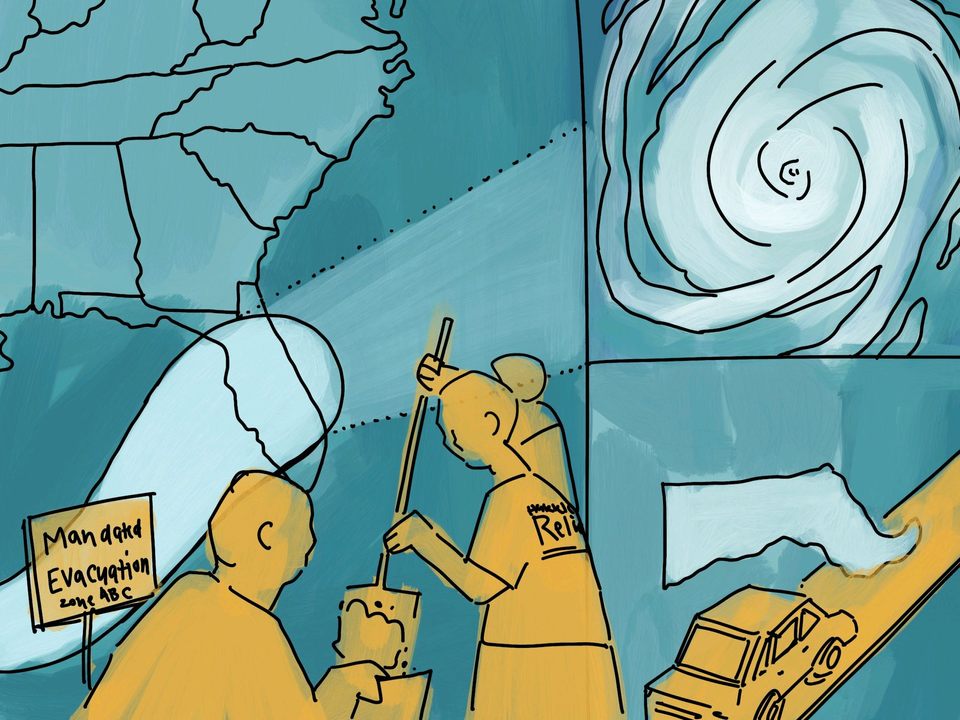Kelly Isenor, director of communications for the Red Cross of Massachusetts, had just more than 24 hours’ notice to pack before her deployment. When she reached Florida, the mix of rain and gusts of wind served as a reminder of both the current and approaching storm.

On Sept. 26, near Perry, Florida, Hurricane Helene made landfall as a Category 4 hurricane with winds reaching 140 mph.
Now, with Hurricane Milton putting 11 million people at risk of flooding, Florida is reeling from back-to-back hurricanes. Around 3.4 million homes and businesses were left without power on Thursday morning, and around 130 tornado warnings were issued across the state, as reported by BBC.
“When I deploy for the Red Cross, it’s usually in a public affairs role,” Isenor said. “Sometimes it’s helping manage social media, just making sure the shelter locations are up to date … sometimes sending information to media so that people know how to find us.”
Now, an unknown number of people remain missing and the death toll is 227 and on the rise, according to the Associated Press.
Massachusetts-based organizations sent volunteers for physical and emotional support, supplies such as meals and water and professional aid, such as Massachusetts Task Force 1.
Massachusetts Task Force 1 is one of 28 federal FEMA teams across the country. The task force consists of police officers, firefighters, medical professionals, engineers, communication specialists and other individuals from all over New England.
“The first few days that they were down there, they were conducting water search and rescue operations, checking structures, checking vehicles in both still and swift water,” said Tom Gatzunis, public information officer for the Massachusetts Task Force 1.
The team is now in North Carolina, where they continue to rescue people and pets in active flood areas, so communication remains a challenge, Gatzunis said.
“Cell service is, in many areas, non existing, so we’re relying on our two-way radios and portable radios,” Gatzunis said. “We have our own generators that we bring down for our own emergency power and operational needs.”
In addition to professional support, Massachusetts sectors of national organizations such as the Salvation Army and the Red Cross continue to send humanitarian aid to impacted states.
“We provide food, hydration, emergency resources such as cleanup kits, clothing vouchers, hygiene products, emotional and spiritual care and any other physical resources that we may have,” said Emily Mew, director of emergency disaster services for the Massachusetts division of the Salvation Army.
According to the Salvation Army’s immediate press release, as of Monday, Sept. 30, the organization’s Massachusetts division deployed “several experienced disaster relief experts to assist with relief efforts in Florida and Georgia.”
Hurricane Helene brought power outages, catastrophic flooding and storm surges that affected millions of Americans across the southeast. But Salvation Army’s most requested service is for emotional and spiritual care, Mew said.
“There’s a lot of people experiencing traumatic emotions after something like this happens,” she said. “Not only have they lost property and their neighborhoods have been destroyed, but there are deaths and people missing still. It’s helpful to have people there to process with them and meet them where they’re at.”
Even though there are more than 1,300 volunteers on the ground in impacted communities, the Red Cross continues to look for additional help. Deployments typically last two weeks, and with the response effort showing no signs of stopping, volunteers currently in the field will need to be relieved, Isenor said.
Hurricane Milton made landfall on Florida’s western coast Wednesday night as a Category 3 hurricane. Milton is striking more densely populated cities, including Tampa Bay and St. Petersburg.
“With the climate crisis, we know that these storms are going to happen again. They’re increasing in frequency and intensity,” Isenor said. “We know that there’s going to be a next storm, so we’re always looking for people that are ready to answer that call.”
















































































































